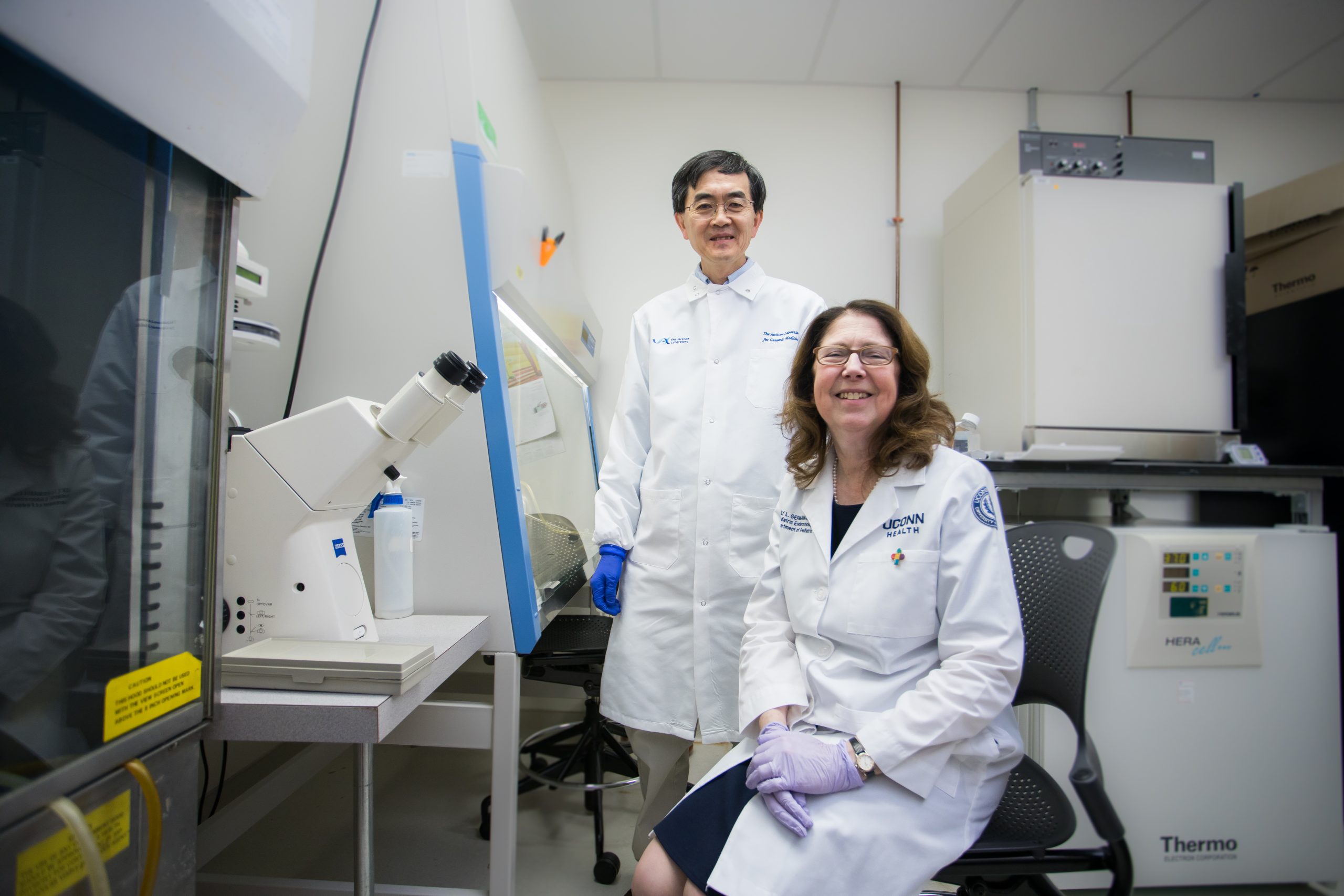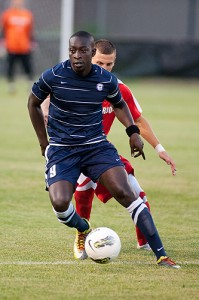
The 2012 Summer Olympics in London, which include several former Huskies competing in various competitions representing the United States and other nations, is a reminder that dozens of student-athletes from around the world find their way to Storrs and to life on a college campus in the U.S.A.
When Stephane Diop ’13 (CLAS) went to the Student Union for the first time to have a meal, the soccer player from Dakar, Senegal recalls having to ask his new teammates for help in ordering something to eat.
“I had to ask them what to get,” he says. “Even though we have turkey at home, it was different from the way it is cooked at home. I had to remember, in case I wanted to come back by myself.”
After nearly four years in Storrs, Diop says his favorite foods now are wings and pizza. “Yeah, I’m a UConn student,” he says, smiling.
Cultural differences such as when the largest meal of the day takes place can also be an adjustment. Niels Giffey ’14 (CLAS), a forward on the men’s basketball team from Germany’s national capital, Berlin, says that in Europe, mid-day is when the main meal of the day is eaten, usually with a light breakfast, and just some bread, a sandwich, fruit, or vegetables for dinner. Most often, food is prepared at home, with going out for fast food a rarity.
“All the food you eat over here is fast food,” Giffey says. “At home you actually sit down with family and eat dinner and spend time talking about the day, instead of ordering food, eating a burger or pizza, and watching TV at night.”
The college sports culture
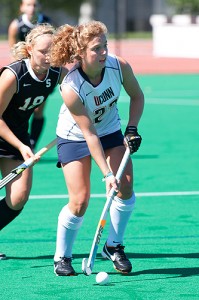
Like all students arriving on campus, student-athletes must adjust to college academics and some homesickness, as well as to a higher level of competition on the field of play. But for student-athletes such as Diop and most other international students who grow up in another culture, there is also the adjustment to living in the United States and in rural eastern Connecticut.
“When I saw universities in Germany, they were all in the city,” says Anne Jeute ’13 (CLAS), a 2011 NFHCA All-America Second Team and All-Big East First Team selection in field hockey from Meerbusch, located just outside Düsseldorf in northwest Germany. “When I came here it was just the campus. I was overwhelmed; it seemed pretty big to me, but it’s not big anymore. I went to First Night for basketball. The players only got introduced and it was packed. I was very confused about this.”
All-American field hockey goalkeeper Sarah Mansfield ’13 (CLAS) from Cornwall, England, says that even though she has spoken English all her life, communication can be a challenge.
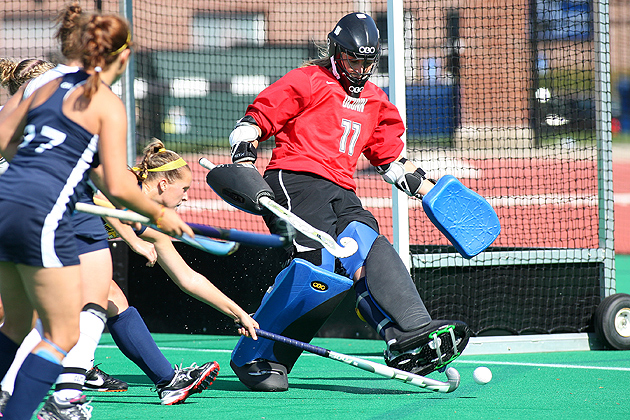
“Obviously we speak English, but you call it British English. Here it’s like American English,” she says. “People wouldn’t understand what I was saying. I say pavement; you say sidewalk. I say car park; you say parking lot. Every week there’s new things [my friends] realize what I’m saying. I’ve become more alert to it now.”
Her compatriot and field hockey teammate Chloe Hunnable ’15 (CLAS), a freshman from Chelmsford, England, says America’s enthusiasm for college sports is a bit of a culture shock.
“University sport in England is not very big at all. The biggest thing is the Oxford and Cambridge boat race,” she says. “Here sport is huge, with scholarships and cheerleaders. The first football game I went to [at Rentschler Field], I nearly cried I was so excited.”
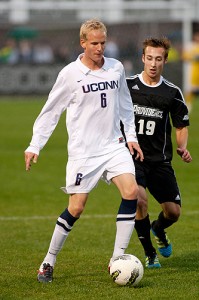
Soccer player Juho Karppinen ’14 (CLAS), a midfielder from Kuopio, Finland, one of the nation’s largest cities, says that after a bumpy first semester, his English has improved steadily and he has adjusted to life in Storrs.
“I knew how to speak English, but didn’t speak it that much,” Karppinen says. “People are more open here. In Finland, we’re more shy and reserved. You keep to yourself. Here people come and talk with you. I’m really enjoying it.”
A high level of competition
While international student-athletes arrive as skilled and accomplished on the field as their American teammates, they also must adjust to the world of Division I competition.
“It’s a different kind of soccer culture,” Karppinen notes. “Here you have more money, the facilities are different. Some professional teams in Finland don’t have the things we have here. I was surprised how good the level [of facilities] is at the University. I knew it was good, but I didn’t know it was that good.”
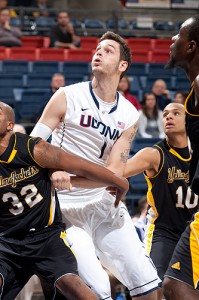
In basketball, the game is much faster on the court in NCAA competition, says Enosch Wolf ’14 (CLAS), a center on the men’s basketball team from Goettingen, a city in north central Germany.
“The game is so much quicker, even though we have a shorter shot clock in Europe,” Wolf says about the 24-second shot clock used by FIBA, similar to the NBA, compared with the 35-second clock used in the men’s college game. “But the way everybody moves is so much quicker, and the athleticism, obviously.”
Adds Giffey: “It’s more one-on-one here. You’re forced to beat your man instead of the system. You’ve got to go by them, instead of setting your screen and beating the situation.”
Hunnable, the 2010 Big East Rookie of the Year, recalls her introduction to the strength and conditioning program for field hockey players last summer.
“I came here and had never done weights before. I was shocked,” she says “That pre-season, I was sliding down the bannisters instead of walking down the stairs. I just hurt so much. But it was definitely worth it.”
Going to the Final Four
Growing up outside of a sports culture celebrated each night on ESPN, international student-athletes soon learn about All-American teams and Final Fours in their respective sports.
“I got an email from [Coach] Nancy Stevens about the All-American Team,” Mansfield says. “I didn’t know what it was. It’s a great honor, now I understand, but for me it means more for the team to be recognized than me personally.”
Adds Hunnable, who reached the 2010 Final Four in field hockey in her first season at UConn: “I didn’t understand the Final Four thing, but when you get there and there are so many more people watching, it was like a buzz, very exciting. I definitely want to go again.”
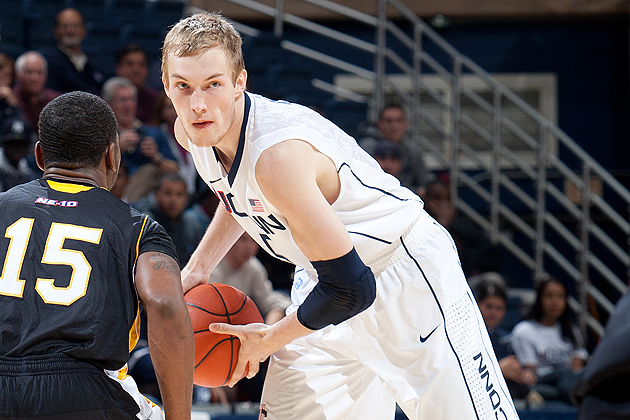
At the 2011 NCAA Final Four in Houston, which provided the Huskies with their third men’s championship, Giffey and Wolf say they had not previously experienced playing before so many people. The semifinals had more than 75,000 in Reliant Stadium.
“I looked at the hoop at the other end and it seemed so far away,” Wolf says.
“I’d never seen something like that,” Giffey says. “But I was so focused on the game, I didn’t think about the fans or anything else. It was really a good atmosphere.”
The two basketball players are looking forward to returning home with their teammates on Nov. 9, when the Huskies open the season against Michigan State at the Ramstein Air Base in Germany, the home of the U.S. Air Force in Europe.
“It will be good exposure so German kids can get to see what a great thing college basketball is,” says Wolf. “Our families actually will get to watch us play live once.”


